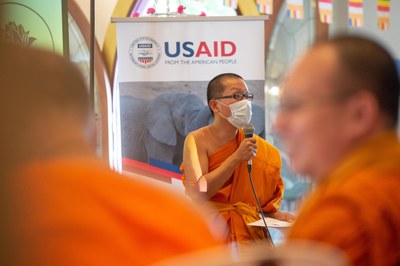USAID Partners with Buddhist Leaders to Counter Beliefs that Drive Demand for Wildlife Products in Thailand
The activity is part of the “No Ivory, No Tiger Amulets” campaign launched by USAID and Thailand’s Department of National Parks, Wildlife and Plant Conservation in March 2020, urging the public to stop using amulets from wildlife products in the belief that these products bring good luck and prevent harm.
USAID Wildlife Asia’s 2018 study Research on Consumer Demand for Ivory and Tiger Products in Thailand revealed that beliefs that elephants and tigers bring good fortune and prevent harm fuel the demand for amulets made of these animals’ body parts. The study found out that among the adult urban Thai population, roughly 500,000 own ivory products and around 250,000 use tiger products. In addition, roughly 750,000 intend to buy and use these products in the future. Moreover, an estimated 2.5 million adult urban Thais find use of ivory products socially acceptable; 1.8 million adult urban Thais find use tiger products socially acceptable.
However, more religious leaders are now recognizing the need to preserve endangered species, such as those mandated by Thailand’s Wildlife Conservation and Protection Act B.E.2562 (2019).
“We recognize our crucial role in influencing people’s attitudes and beliefs about wildlife products, and are committed to help reduce the use and purchase of amulets made from endangered, illegal animals through our regular interactions with our followers,“ stated the Venerable Phra Maha Pranom Dhammalangkaro, Abbot of Wat Chak Daeng.
During the workshop, the participants discussed the status of the illegal wildlife trade in Thailand, current demand for wildlife products in Thailand, and the “No Ivory, No Tiger Amulets” campaign to reduce the use and purchase of amulets derived from illegal wildlife. The monks and nuns offered insights on their crucial role in amplifying demand reduction messages that will strongly influence attitudes and behaviors, and ultimately, social norms. Through the action plan, they committed to integrate wildlife demand reduction messaging in their dharma sermons and conversations with followers.
“The U.S. Government is honored to work alongside the International Network of Engaged Buddhists to reduce the demand and consumption of wildlife products and fight wildlife crime in Thailand,” said Mr. Saroj Srisai, Project Management Specialist (Ecosystems Management and Trade) of the USAID Regional Development Mission for Asia.


